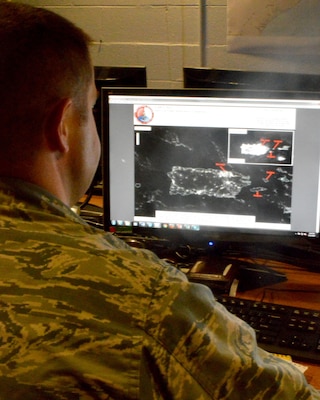By Air Force Master Sgt. Robin Brown Tennessee National
Guard
NASHVILLE, Tenn., Sept. 18, 2017 — Members of the Tennessee
Air National Guard's 118th Intelligence, Surveillance and Reconnaissance Group
based at Joint Base Berry Field here are supporting the Federal Emergency
Management Agency's relief efforts in response to Hurricanes Harvey and Irma.
The 118th ISRG is working with other units across the
country to process, analyze and disseminate images and video of
hurricane-damaged areas to aid in recovery efforts. The unit is providing
damage assessment to FEMA for areas in Texas, Florida and Puerto Rico, using
images to identify and prioritize critical-need areas, a 118th ISRG intelligence
officer explained. The name of the officer, a captain, is being withheld for
security reasons because of the unit's intelligence mission.
Most of the images are gathered from open-source information
from the Civil Air Patrol, as well as from military and civilian aircraft
relaying aerial imagery. The 118th is assisting with image and video
compilation and is identifying heavily damaged areas where people may be
stranded.
Getting the Big Picture
"After aircraft have flown over and documented the
damage, that information comes to us," said a geospatial analyst with the
118th ISRG, a senior airman whose name also is withheld because of the unit's
intelligence mission. "We are sort of the nexus for information to get the
bigger picture to those on the ground who are providing rescue and recovery
operations." The 118th put together 'before' and 'after' images to aid in
determining the level of damage. Each unit involved in the effort is assigned
different areas to assess damage and identify critical areas.
The Nashville unit was tasked with a few oil refineries
during Hurricane Harvey relief efforts. After Hurricane Irma, the unit was
tasked with Puerto Rico. The unit developed a power outage map using NASA
images and facilitated Puerto Rico National Guard recovery efforts.
One of the geospatial analyst's tasks was to check the
conditions of airfields in Puerto Rico and determine whether aircraft could
land there for recovery operations.
"There were no issues, so if they need to land there,
it is safe," said the analyst, who serves as a police officer when not on
duty with the National Guard.
The 118th ISRG normally is assigned missions from the
active-duty Air Force. Something that sets the National Guard apart from its
active duty counterparts is its ability to provide support at a state level
during times of natural disasters, he said.
"It is nice to support a state mission," he added.
"I enjoy serving my country both as a police officer and as a member of
the Air National Guard. I love helping people."
The intelligence officer agreed.
"Helping out our own people who are suffering and need
assistance is more personal," said the captain, who works full-time with
the National Guard. "It is very fulfilling to use our skill set during a
natural disaster."









No comments:
Post a Comment